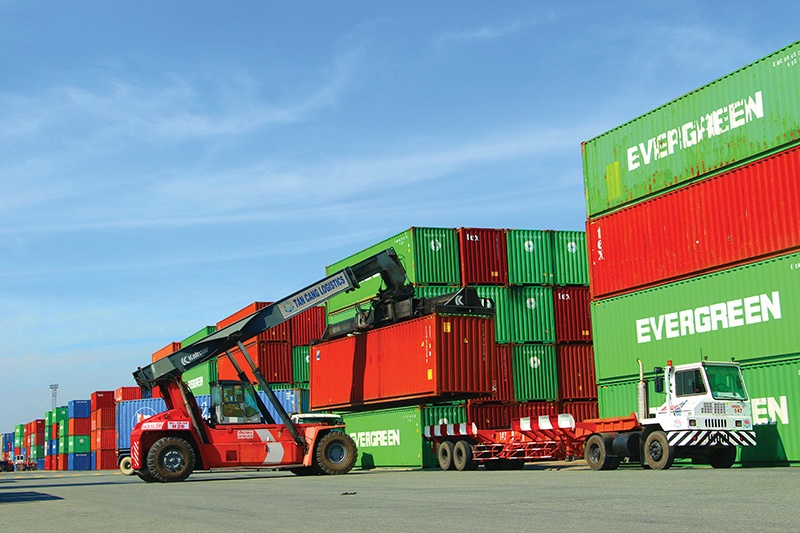Woes persist in logistics regulations
 |
| The logistics sector has been hammered this year with spiralling costs and container shortages. Photo: Le Toan |
According to the Organisation for Economic Co-operation and Development’s (OECD) recently-released study on small-package delivery services and logistics in Vietnam, there are obstacles in the sector arising from statutory barriers, such as restrictive regulations. The OECD found that logistics as a whole is qualified in legislation as a “conditional business sector”, with the consequence that foreign direct investment (FDI) must satisfy certain conditions and is subject to specific limitations.
Amongst others, foreign investors must obtain merger and acquisition (M&A) approval and meet several requirements on economic needs test, morality, community health, and more. Furthermore, foreigners are not allowed to hold more than 49 per cent shareholding in a public company.
“Over the last 20 years, Vietnam has seen increasing M&A activity, whose percentage growth in terms of value has been faster than in comparable ASEAN economies,” said Ruben Maximiano, a senior competition expert at the OECD. “In regards to investments by foreign companies, Vietnam has made significant reforms to liberalise its FDI regime since 1987. Despite such reforms and increasing M&A activity, foreign companies still face challenges when investing in Vietnam.”
Maximiano told VIR that the inclusion of logistics in the list of conditional business sectors affects logistics activities as diverse as sea freight transport services, container handling, goods transport brokerage services, freight transport services on inland waterways, and road transport services, to name a few.
Higher FDI regulatory restrictiveness in the Vietnamese transport sector compared to certain ASEAN countries is also reflected in the OECD FDI Regulatory Restrictiveness Index, which measures statutory restrictions on FDI in 69 countries.
In order to remove barriers limiting foreign investments in the logistics sector, the OECD recommended excluding logistics-relevant activities from the list of conditional business sectors. This could be done by applying provisions that are already laid down in Vietnam’s legislation. Such provisions grant the government the power to review activities qualified as conditional business sectors, based on socioeconomic considerations.
According to Jeffrey Tan, head of Group Corporate Development and Technologies at YCH Group, Singapore’s largest home-grown supply chain solutions company, there are still challenges for foreign logistics firms to expand their business in Vietnam. One such instance is the lengthy administrative procedures, and delays in customs clearances will also only increase operational costs.
The establishment of new companies is also subject to conditions on ownership and services, with services being clearly segmented into 16 types, such as cargo handling services, container warehousing services, and cargo agency services. This will lengthen the paperwork for companies like YCH Group, which primarily focuses on being an integrated end-to-end supply chain and logistics solutions provider.
“Although the areas of logistics business in Vietnam have considerably improved as compared to when YCH Group entered the market back in 2009, there are still plenty of restrictions for foreign logistics firms to expand their business in the country, and it is far from being a liberalised logistics industry,” Tan said.
“The Vietnamese government does not only need to focus on simplifying administrative reforms, but also increases investments in logistics infrastructure and warehouses to strengthen its logistics ecosystem and regional connectivity,” Tan added. “This will not only reduce logistics costs, but also increase Vietnam’s trade competitiveness on the global stage.”
In the World Bank’s Doing Business 2020 report, Vietnam was ranked 70th among 190 economies, with reforms focusing on access to credit and taxes. Vietnam still ranks low on the aspects of starting a business and paying tax, ranking 115th and 109th, respectively. Moreover, the report also stresses the need for further digitalisation and streamlining of administrative processes to boost the country’s business environment.
“These will be key factors for Vietnam moving forward,” Tan said. “While there are already reforms in paying taxes and slowly easing procedures in starting a new business, these are the two areas Vietnam still needs to continue to work on.”
According to estimates, Vietnam’s logistics sector will continue growing with an estimated compound annual growth rate of 13.6 per cent until 2023. The sector is dominated by freight transport by water, which accounted for 48 per cent of the total logistics revenues in 2017, though freight transport by road also accounted for a large percentage.
Vietnam has adopted an action plan for the development of logistics services by 2025, which includes ambitious goals regarding infrastructure, policies, business capacity and human resources.
What the stars mean:
★ Poor ★ ★ Promising ★★★ Good ★★★★ Very good ★★★★★ Exceptional
Related Contents
Latest News
More News
- SK Innovation-led consortium wins $2.3 billion LNG project in Nghe An (February 25, 2026 | 07:56)
- THACO opens $70 million manufacturing complex in Danang (February 25, 2026 | 07:54)
- Phu Quoc International Airport expansion approved to meet rising demand (February 24, 2026 | 10:00)
- Bac Giang International Logistics Centre faces land clearance barrier (February 24, 2026 | 08:00)
- Bright prospects abound in European investment (February 19, 2026 | 20:27)
- Internal strengths attest to commitment to progress (February 19, 2026 | 20:13)
- Vietnam, New Zealand seek level-up in ties (February 19, 2026 | 18:06)
- Untapped potential in relations with Indonesia (February 19, 2026 | 17:56)
- German strengths match Vietnamese aspirations (February 19, 2026 | 17:40)
- Kim Long Motor and AOJ Suzhou enter strategic partnership (February 16, 2026 | 13:27)

 Tag:
Tag:




















 Mobile Version
Mobile Version